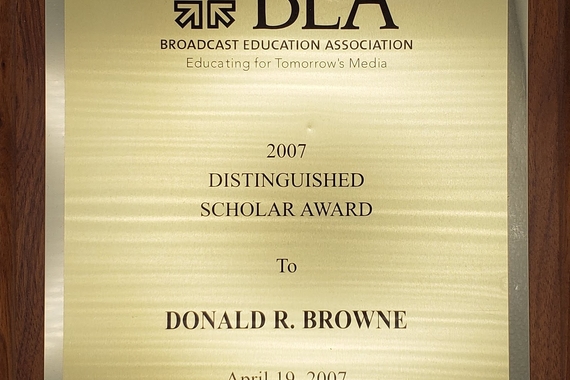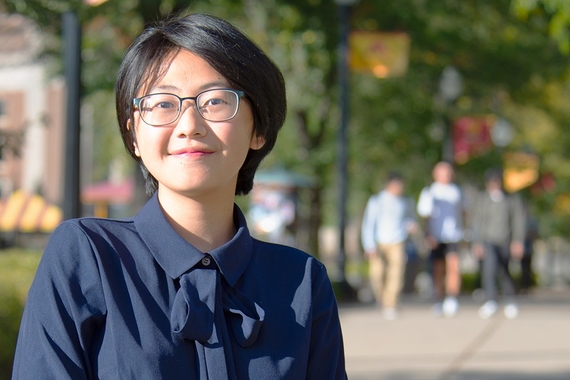Music That’s Making a Difference
When Old Man Winter comes to Minnesota, we tend to greet him with a lot of salty snacks--specifically sodium chloride, or as we usually call it, road salt. But did you know using all that road salt is hurting Minnesota’s watershed?
Communications professor Mark Pedelty has a tool to teach you how to be smarter about salting your sidewalk. It’s got a catchy beat and a harmonica solo.
Through his research in ecomusicology, Mark Pedelty uses the power of music to raise awareness of environmental issues and get community members involved.
When he began his research in ecomusicology, Pedelty says, “Concerns about toxins and the environment had not really been incorporated in music research and that needed to be done.” Pedelty has traveled the world researching and working with musicians to discover the link between environment and music.
Paulo Freire was a Brazilian philosopher who focused on the idea of collaboration and community, and Pedelty has incorporated these concepts into Ecosong.net. “Freire's conceptions of community dialogue, praxis (relating theory to practice), and codification are put into play with each video project. Codification is about creating a tangible reference for a community's shared purpose, and these collaborative music videos seem to do that well.”
When colleagues and community members pitched the idea of launching Ecosong.net, they had the goal of using something everyone everywhere can relate to— music—as a way to connect communities to local environmental issues.
Ecosong.net Project
From his article in the Journal of Music History Pedagogy, Pedelty writes, “Ecosong is one such attempt to ‘connect with people’ in the local community in order to learn with them, make music and media together, and accomplish a shared goal.”
The process of launching an Ecosong.net project begins with an organization with a message to communicate. For each project they write and record a song, produce a music video, and sometimes hold live performances. Tim Gustafson, a professor in the U of M’s Department of Writing Studies, has helped write and produce many songs.
Recently, the Ecosong.net collaborative worked with the Minnehaha Watershed District to educate the community on the negative impacts of chloride pollution. With never-ending snow in Minnesota, this song raises awareness of the consequences of salting our roads and sidewalks. The song, titled “Watershed,” features University of Minnesota dance students, who choreographed a dance featured in the music video.
Another song, titled “You Can Build A Garden,” features three winners from a community contest. The Minnehaha Creek Watershed District provided a $1,500 grant from the Cynthia Krieg Watershed Stewardship Fund that allowed three winners to perform and record the music video. Winners Rosie Jablonsky, Jayanthi Kyle, and Robin Kyle appeared in the video to bring attention to using rain gardens, which collect rainwater runoff, filter out pollutants, and allow the water time to soak back into the ground, recharging groundwater aquifers.
“We Live in the Lake,” a co-written piece by Pedelty raises awareness about the Lake Pepin Legacy Alliance, which advocates for this Minnesota lake which is under threat from excessive sedimentation. By working with local organizations to build campaigns around current environmental issues, Pedelty and the individuals he works with are making an impact in environmental awareness and are making these issues known to the local community and beyond.
Music in a Changing Climate
With a new grant from Humanities Without Walls, an organization that supports cross-institutional scholarship, Pedelty and a team of five graduate students from the University of Minnesota and University of Illinois at Urbana-Champaign will travel outside of the US to organize music video projects in British Columbia, Brazil, Tanzania, India, and China to look at environmental concerns unique to each nation. Faculty and graduate students from the U of M, Indiana University, and the University of Illinois are taking part in the project, funded by the Mellon Foundation and Humanities Without Walls initiative.
This global external grant provides funding for a project called Music in a Changing Climate: A Field-to-Media Model for Community Engaged Ecomusicology.
Building a Curriculum
As Ecosong.net continues to grow, Pedelty is optimistic about the future that lies ahead. Curricula are being developed around each video for use in parks and schools. Undergraduate students, including Claire Doty and Ella Johnson, have been leading this aspect of the project and Pedelty sees this as a promising way of making these musical projects matter. In addition to the curricula, Pedelty and his team are making these projects matter through film festivals, where Ecosong.net has garnered 17 official selections and awards, and social media.
This story was written by an undergraduate student account executive in CLAgency. Meet the team.


